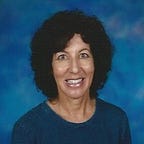Why Isn’t Grief Support A Required Course For Medical Professionals?
At some point, every patient will have a need for this at least once in their lives.
A recent experience left me wondering why grief support training is not taught in medical school. From a cursory review, it appears that physicians have few options and seemingly no requirements to learn about grief and how to best support their patients experiencing grief. A few weeks ago I saw two doctors for a broken collarbone and had two very different interactions.
The first doctor was my surgeon. He sat me down, personally took X-rays, and then patiently explained my options. My collarbone was in pieces and the X-ray looked like a “jigsaw puzzle.” I explained to him that I was a grieving mother, that my youngest daughter died a year and a half ago, and that exercise and keeping busy was my coping mechanism–losing that coping mechanism would be detrimental to my mental health. I asked that he take an aggressive approach so that I could resume my activities as soon as possible.
This doctor (Dr. A) was kind and compassionate. He validated and empathized with my situation. He said surgery would give me a full range of motion within two weeks and he scheduled my surgery for Monday (I saw him on Friday). He gave me time to ask questions, answered me patiently, and reassured me. In every way, he showed me that he heard my concerns and made me feel he had my best interests at heart. I felt supported and cared for.
Next, I was sent to a cardiologist to get a check-up for pre-approval for surgery (Dr. B). While waiting for the doctor to arrive my pain ratcheted up to an agonizing level. Dr. B finally arrived and I explained my situation. She barked many questions at me, barely leaving time for me to answer, and seemed content to lecture me and tell me all the things I could be doing better.
Then she took my family history. When we got to my children, I told her I had three daughters. She asked me their ages and I explained that my youngest daughter died almost 18 months ago.
Her response? “Well, at least you have two other children. I only have one daughter, can you imagine if I lost her?”
In shock, I murmured, “Well it doesn’t quite work that way…”
She stared at me and said, “No? Well anyway, you have no choice; you just have to move on, that’s the way it is.”
That’s it, that was our conversation. I kept quiet because I just wanted her to sign the papers to approve me for surgery. I would have loved to give her a little advice about talking to grieving patients. I got my approval and left her office as quickly as possible.
So many things wrong with that conversation. Let’s unpack. A good doctor takes a holistic approach. Yes, they must focus on the physical issue but neglecting the patient’s emotional needs is counterproductive. Having an understanding of the factors that serve as links between mental health and physical health can enable doctors and their patients to make choices that will benefit the patient’s overall well-being. I do not expect medical doctors to have dual degrees in counseling. However, they should learn basic attending, listening, and observational skills when caring for a patient.
Attending skills consist simply of helping patients feel safe to express their thoughts and feelings openly. This can be as simple as keeping quiet and looking at the patient. Listening is having the ability to understand the messages the patient is communicating. That is, not just listening to the verbal cues but also listening for the nonverbal messages and putting them together to understand the patient on a deeper level. Finally, observation is also looking at nonverbal behaviors, facial expressions, posture, movements, and reactions and putting them all together.
These skills come naturally for some but not for all. Luckily, anyone can learn them with training. These should be core skills for any helping profession. I also think that a focus on patients living with grief is important. It is surprising to me that most clinical training does not teach about grief and loss given that most of us are going to experience it, probably many times in our lives. Grief training would help physicians to know the appropriate words better to say and actions to take for a grieving patient. Learning to have a conversation and asking appropriate questions is a skill that can be learned just like learning to give an injection or perform surgery. While physicians are always pressed for time, for the most part, it only takes a few extra minutes to provide patients the space to feel heard.
